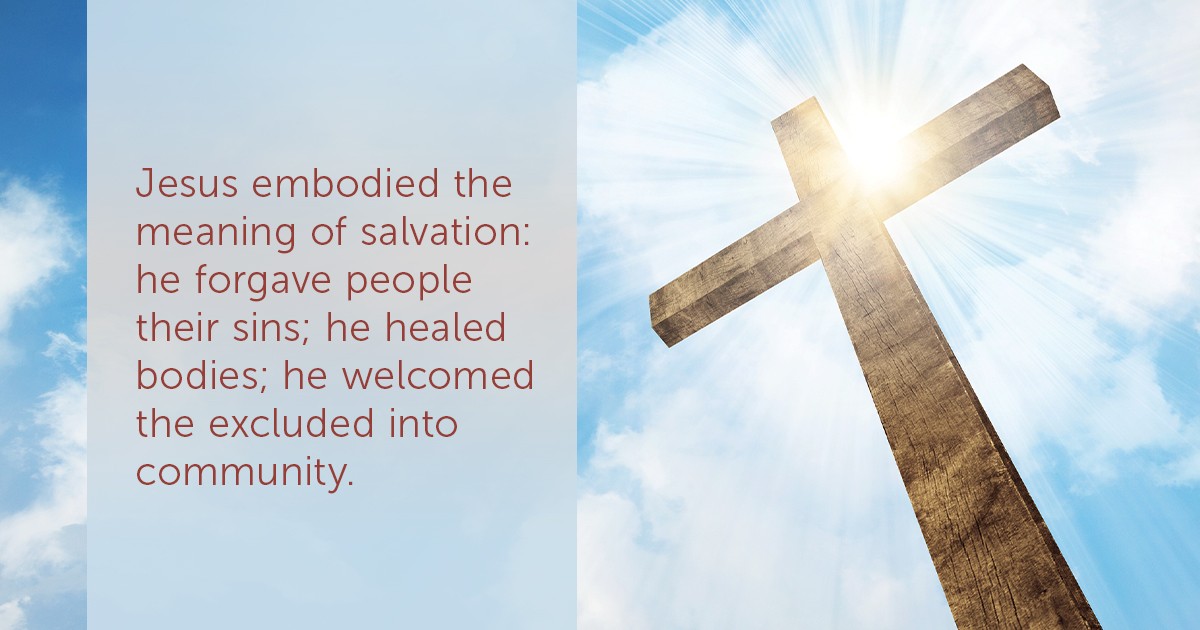“Who for us men and for our salvation came down from Heaven.”—Nicene Creed
It’s a Christian conviction that our world is not the world as God intends. In far too many respects it is a broken world, a wounded world. Its injustices, hatreds and invisible boundaries do not characterize the world God envisions. In response, however, God has acted, and continues to act, with grace. The comprehensive term used to speak of God’s response to our human condition is salvation. And the Nicene Creed has an important contribution to make toward our understanding of salvation.
The biblical concept of salvation is rich in its immensity. The Gospel of Luke begins with the chorus of angels near Bethlehem: “To you is born this day in the city of David a Saviour” (Luke 2:11 NRSVUE). In his public ministry, Jesus embodied the meaning of salvation: he forgave people their sins; he healed bodies; he welcomed the excluded into community. In the New Testament, salvation is portrayed as eternal life, new creation, reconciliation, justification and peace that creates a new community. In the Apostle Paul’s language, Christian believers are saved, are being saved and will be saved. For reasons such as these, William Booth named it a “boundless salvation.”
As with any concept, however, the Christian understanding of salvation underwent changes throughout the history of the church. During the complexity of that history, salvation became polarized, even fragmented. The Greek-speaking church in the East emphasized humanity’s diseased nature. In response, it focused on the life of Christ and depicted salvation as learning to be healed here and now. The Latin-speaking church in the West emphasized humanity’s guilt. It focused on the cross and depicted salvation as personal forgiveness from sin with a future in heaven. If asked today, many of us would say we are saved because we believe Jesus died for our sins. This is true, but there is more. A narrow view of salvation results in a narrow mission of the church. What is needed is the recovery of the wholeness of Christian salvation.
One way of recovering the immensity of salvation is to view it through the lens of the Nicene Creed (excerpts quoted in italics in this section). The creed connects our salvation with the one Lord Jesus Christ. For our salvation this very God of very God became incarnate. In the language of John’s Gospel, “the Word became flesh and lived among us” (John 1:14 NRSVUE). The importance of this for our salvation is expressed by Gregory of Nazianzus when he says, “That which is not assumed is not healed.” Jesus has shared our full humanity and thus can save us fully. Yet his compassionate grace evoked opposition from those threatened by it, who turned him over to Pontius Pilate.
For our salvation Jesus was crucified. However, by his wounds we have been healed (see 1 Peter 2:24), and on the third day he rose again. On one occasion Jesus declared, “I am the resurrection and the life” (John 11:25). To experience resurrection life here and now is the gift of salvation. And this life is available to us because the risen Christ ascended into Heaven and sitteth on the right hand of the Father.
It is from his place of exaltation that Jesus pours out the Holy Spirit on the Day of Pentecost (see Acts 2:33). The Spirit, the Giver of life, makes real the gift of salvation in the life of believers. Thus, Paul can say in Titus, “When the goodness and loving kindness of God our Saviour appeared, he saved us … through the water of rebirth and renewal by the Holy Spirit” (Titus 3:4-5 NRSVUE).
And this same Saviour shall come again with glory. Salvation is a reality now, and yet there is “a salvation ready to be revealed in the last time” (1 Peter 1:5 NRSVUE). God’s future will be characterized by the full realization of God’s immense salvation.
Viewing Christian salvation through the lens of the Nicene Creed helps to restore its immensity, thus, to shape us and our mission. A mission that practises hope for the addicted, the celebrity, the excluded and the wealthy. All for our salvation.
MAJOR RAY HARRIS is a retired Salvation Army officer and author of Convictions Matter. His co-author of this series, Dr. James Read, was the executive director of The Salvation Army Ethics Centre for 27 years and was a member of the International Theological Council. Major Harris and Dr. Read attend Heritage Park Temple in Winnipeg.
We Believe is a six-part series on the Nicene Creed, which marks its 1,700th anniversary in 2025. This is the fourth article in the series. Read Part 1. Part 2. Part 3.
Illustration: Photo: KevinCarden/Lightstock.com
This story is from:










This reflection beautifully reminds us that salvation is far more than just personal forgiveness—it’s the comprehensive, ongoing work of God to heal, renew, and restore all things. Viewing salvation through the lens of the Nicene Creed expands our understanding and calls us to live out a mission shaped by Christ’s life, death, resurrection, and the Spirit’s work among us.